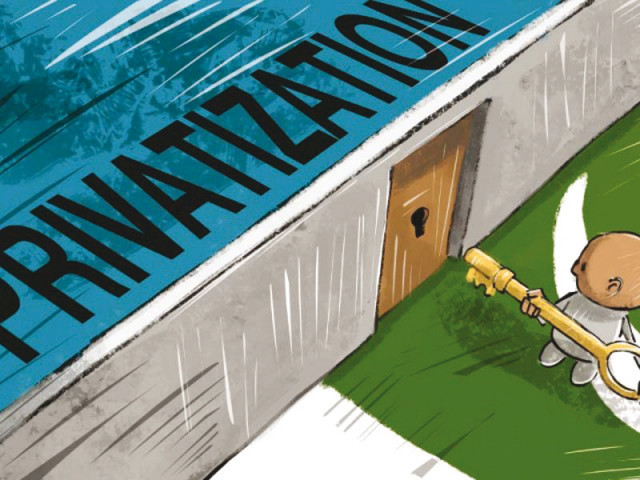Cabinet okays ordinance to ease privatisation
Provisional law to stop high courts from entertaining cases related to privatisation of state’s assets

In a major development, the federal caretaker government has decided to issue a presidential ordinance to stop constitutionally-established high courts from entertaining any case related to privatisation of Pakistan’s assets. The caretaker government, whose extended tenure is set to end in February next year, has taken the drastic step a month after the Lahore High Court (LHC) admitted a petition challenging the proposed privatisation of the Pakistan International Airlines (PIA), the national flag carrier.
The caretaker federal cabinet has approved the draft of the Privatisation Commission (Amendment) Ordinance, 2023 that would be promulgated anytime by President Dr Arif Alvi, according to the sources in the Ministry of Privatisation. But the radical step by the interim government raises many questions about its authority to limit the powers of the high courts that have been established under the Constitution, particularly when no privatisation transaction is at the moment linked with any international agreement.
Interim Privatisation Minister Fawad Hasan Fawad has confirmed to The Express Tribune that the cabinet has given approval to the Privatisation Commission Amendment Ordinance 2023. Fawad said: “[The] purpose of the Ordinance is to provide investors the confidence to invest with the understanding that instead of multiplicity of litigations around the country there would be only one forum to redress any legal issues arising out of any transaction with an appeal to the Supreme Court”.
The minister had been requested to comment about the reasons for issuing the ordinance when no privatisation transaction is linked with any international loan agreement nor there is any emergency situation that may empower the caretaker government to take such a drastic step. But Fawad said the decision to establish Privatisation Appellate Tribunal “provides a singular forum for disposal of cases arising out of any privatisation transaction”.
Read Investors review privatisation plans
The PIA privatisation remains the topmost priority of Fawad who has already been empowered by withdrawing the authority of Finance Minister Dr Shamshad Akhtar to chair the meetings of the Cabinet Committee on Privatisation. The PIA privatisation process remains slow, although the government has bypassed the international competitive bidding process to hire financial advisers.
The interim cabinet has approved to amend Section 28 of the original 2000 Privatisation Ordinance, which had described the functions of the high courts to hear civil and criminal cases related to any privatisation transaction. The new ad-hoc law states that “no court other than the Privatization Appellate Tribunal constituted under this (new) Ordinance, hereinafter called as the Appellate Tribunal, shall exercise jurisdiction under this Ordinance”.
The life of a presidential ordinance is only 120 days and it can be further extended by another 120 days by the National Assembly. The original but to be repealed Section 28 stated that “the High Court shall exercise exclusive civil and criminal jurisdiction to adjudicate and settle all matters related to, arising from or under or in connection with this Ordinance; to adjudicate and settle all matters transferred it; and to try offences punishable”.
The minister said the ordinance, as approved by the federal cabinet, provides the Privatisation Appellate Tribunal the jurisdiction for the purposes of hearing and deciding civil and criminal matters. Last month, the LHC issued notices to the caretakers regarding a petition challenging the proposed privatisation of the PIA.
Justice Raheel Kamran Sheikh observed that the petition challenging the PIA privatisation raised questions of public importance involving constitutional law. The petitioner had pleaded before the provincial court that the caretaker government had no jurisdiction to engage in the privatisation of PIA, considering its limited scope and authority
What constitutional expert says
“The power of the high courts under Article 199 (of the Constitution) cannot be taken away. However, the existence of these tribunals will be used to ask the high courts to not entertain writ petitions on the ground that there is an alternative forum available,” said Salman Akram Raja, Pakistan’s renowned constitutional expert and lawyer at the Supreme Court.
Fawad stated that the chairperson of the three-member Privatisation Appellate Tribunal would be a person who has been a judge of the high court along with a judicial and a technical member. “Any person aggrieved by an order of the Appellate Tribunal may within 60 days thereof prefer an appeal to the Supreme Court,” said the minister.
However, unlike a serving high court judge who cannot be removed by the federal government, the authority to remove the chairman of the appellate tribunal has been given to the federal government, showed the approved ordinance. “The federal government may, by a notice of not less than 30 days and after affording opportunity of being heard, remove from office the chairperson or a member of the Appellate Tribunal on the ground that he is incapable of properly performing the duties of his office by reason of physical or mental incapacity or having been guilty of misconduct,”, said to the approved ordinance.
Read PIA retrieves aircraft after two-year stranding
Fawad said multiple cases have been pending in courts across the country for over 30 years. There are investors who have made all payments but are unable to secure rights over a property or who have acquired rights over a property but have failed to deposit requisite payments to the commission.
The minister said the Appellate Tribunal would only be adjudicating cases arising out of privatisation matters, and hence would be better placed to dispose of these cases expeditiously which have been pending for decades.
The government has made the ad-hoc legislation effective from the year 2000. This may create legal challenges for the government due to the issue of retrospectivity. To a question, whether a caretaker government can implement an ad-hoc piece of legislation with effective from the year 2000, Fawad said “proviso to Section 230 of the Elections Act 2017 empowers the caretaker government to take any action or decision regarding existing bilateral or multilateral agreements or the projects already initiated under the Privatisation Commission Ordinance 2000”.
Functions of appellate tribunals
The federal government shall, by notification in the official gazette, constitute the Appellate Tribunal consisting of a chairperson, one technical member and one judicial member to be appointed by it. A retired judge of the Supreme Court or a high court will be appointed as the tribunal’s chairperson. He shall be entitled to the salary, perks and privileges as were last drawn by him as judge.
The approved ordinance stated that the Appellate Tribunal shall, for the purposes of hearing and deciding civil and criminal matters, have the same powers as are vested in a civil court or, as the case may be, in a criminal court trying a suit or case under the Code of Civil Procedure, 1908 or the Code of Criminal Procedure, 1898.
The Appellate Tribunal has been given powers to summon and enforce the attendance of any person and examine him on oath; requiring the discovery and production of documents and material objects; receiving evidence on affidavits; and issuing commissions for examination of witnesses and documents.
Through ad-hoc legislation, the caretakers have repealed Section 29 and replaced it with a new one. The newly inserted section states that “any person aggrieved by an order of the Appellate Tribunal may within 60 days thereof prefer an appeal to the Supreme Court.” Through this one piece of ad-hoc legislation, the government has approved to transfer all the cases pending before the high courts to the proposed privatisation appellate tribunal.



















COMMENTS
Comments are moderated and generally will be posted if they are on-topic and not abusive.
For more information, please see our Comments FAQ